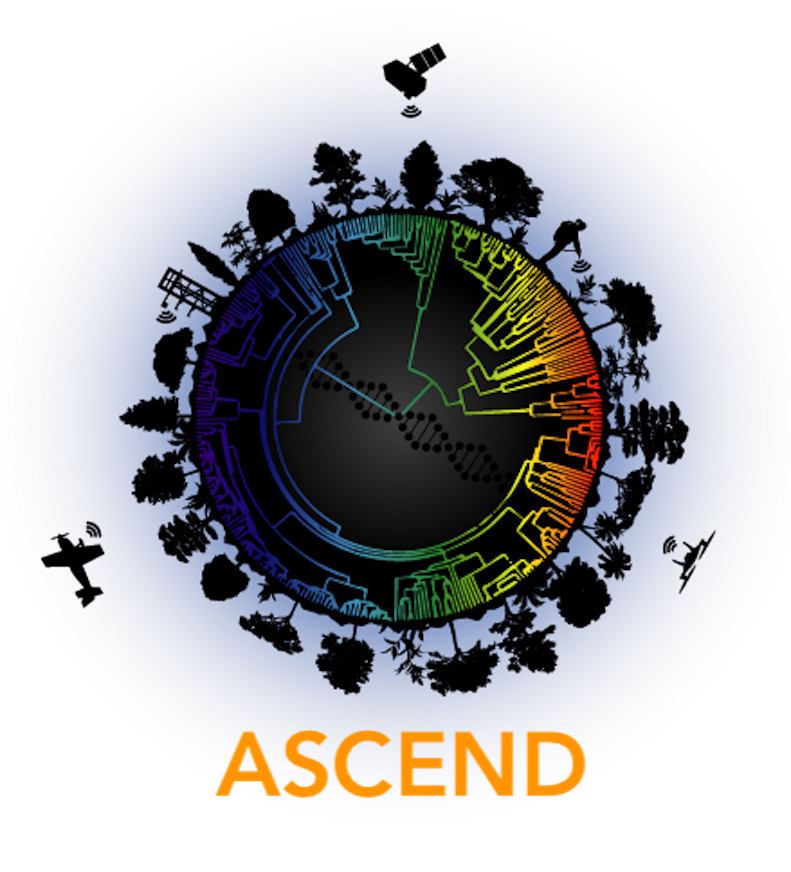NextGen: Aaron Lee
Aaron Lee, postdoctoral researcher at the University of Minnesota, with the gigantic leaves of the tropical Coccoloba rugosa tree at the Fairchild Tropical Botanic Gardens in Miami, FL. The coccoloba tree is in the buckwheat family (Polygonaceae).
Tell us about yourself
Hi! My name is Aaron Lee, and I am a PhD student with Ya Yang at the University of Minnesota. I am broadly interested in understanding how plant diversity has evolved, and in developing methods to create, use, and understand big biodiversity datasets.
What are the main research projects you working within ASCEND?
My research projects in ASCEND are focused on using reflectance spectroscopy to tap into the plant diversity preserved in herbarium collections. These museum specimens have been collected from all over the world and preserved over centuries, representing treasure troves of information that span many dimensions of biodiversity. While herbarium specimens serve as occurrence records of plant species, they are also collected to be handled and pulled apart. Destructive uses include dissection for taxonomic studies, and tissue collection to measure functional traits such as secondary chemistry or stomatal density. However, these destructive uses are not universally applicable, as many specimens are delicate or represent rare occurrences from remote localities. Reflectance spectroscopy offers an indirect, nondestructive method to use light spectra for taxonomic studies and to predict plant functional traits.
I am using the buckwheat family, Polygonaceae, as a case study to investigate the utility of reflectance spectroscopy to predict functional traits from herbarium specimens preserved in the University of Minnesota Herbarium. In this family, two parallel transitions from moist to dry habitats have occurred globally. I will test trait models developed by ASCEND collaborators to predict traits from herbarium spectra, and use macroevolutionary modeling to test hypotheses about the evolutionary trends underlying these parallel transitions in Polygonaceae.
What do you find challenging about being and early career researcher (ECR)?
As with any field or industry, there are many unwritten rules to learn that are norms of the community. In comparison to a corporate setting, ECRs in academia have smaller cohort communities and near-peers who are able to explain these norms. There is also less structural support from ECR training programs to help navigate new or sticky situations. For example, independence is highly valued, but “independence” can also be understood as being able to seek out help, find collaborations to fill gaps in projects, and ask for feedback without direct guidance from your supervisor–not literally working on your research projects by yourself. I have found this to be the most challenging aspect of being an ECR, where words and expectations have additional, hidden meanings behind what is explicitly said or written. To a certain degree, these norms can only be learned experientially; I have felt incredibly lucky to have mentors and near-peers throughout my career to demonstrate and explain how to find success in these confusing situations. Structural changes in graduate programs, ECR-led organizations, and society-led initiatives are helping new ECRs to uncover these hidden curricula.
How would you explain your research to someone who is not a scientist?
Plants have learned to thrive in extreme environments, from hot, dry deserts, to the sun- and wind-exposed faces of mountain peaks. My research is all about understanding how plants evolved strategies to deal with these challenges, and how these strategies might differ between plant species. I focus on a specific group of plants, the buckwheats, to ask and answer these questions. This group includes crops, invasive weeds, and ecologically important trees. We don’t fully understand the relationships between species in this group, or the processes that have allowed such closely related species to take on such dominant roles in their ecosystems. My work will help to fill gaps in the tree of life, which is the foundation of all biological study. Additionally, understanding the climatic conditions which shaped these strategies may help to predict the ability of plants to respond and adapt to rapid global climate change today.
What are your hobbies and preferred activities when you are not doing science?
I am a runner and love to be active in all kinds of weather! I love being outdoors hiking, biking, and trail running with friends. I’ve explored many of the extensive trail and parks systems throughout the Twin Cities, and especially love Theodore Wirth Park and running along the Mississippi River. I also like to cook and eat, and am always finding new grocery stores, markets to explore, and restaurants to try. I’m a sucker for warm, crusty bread and a funky cheese!


